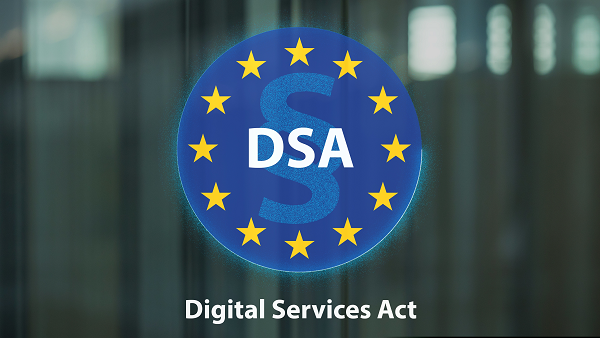What does the EU’s new Digital Services Act mean for your business?

In July 2022, the EU passed two new laws governing the use of technology as it affects EU citizens: the Digital Services Act and the Digital Markets Act. Although the UK is no longer a member of the EU, its legislation continues to affect UK businesses and to set a gold standard for tech regulation around the world. Here’s what you need to know.
The two bills – the Digital Services Act and the Digital Markets Act(1) – together have been designed to address the societal and economic effects of the tech sector. They do this by setting clear standards for how tech businesses should operate and provide services within the EU.
What are the two Acts designed to deliver?
Primarily, the Digital Services Act is designed to increase the accountability of online platforms and marketplaces with the principle that what is illegal offline should be illegal online.
The Digital Markets Act sets out practices to prevent unfair business practices and rein in the power of platforms with dominant online positions, especially when their dominance makes it hard for consumers to avoid them. It seeks to mitigate that dominance and avoid vendor lock-in.
Non-compliance with the Digital Services Act can be as high as six percent of global turnover in the preceding year – and repeated non-compliance could result in the tech firm being banned from doing business in the EU.
Fines for non-compliance of the Digital Markets Act can be as high as ten percent of global turnover in the preceding year – or up to 20 percent for repeated non-compliance.
What does the Digital Services Act mean for UK businesses?
If you advertise in the EU, the Digital Services Act may impact your targeting and messaging. When the Digital Services Act comes into force in 2024, you will no longer be allowed to advertise to children or based on sensitive data such as religion, gender, race or political opinion.
It should make the platforms on which you advertise safer, however, as they will need to flag and remove illegal content more quickly. This should make them safer places on which to market your product.
It also offers you improved brand protections because online marketplaces, such as Amazon, will need to implement more effective and rapid systems to flag and remove suspect products, such as counterfeit goods or products that do not meet EU safety standards.
What does the Digital Markets Act mean for UK businesses?
Few businesses will be directly impacted by the Digital Markets Act. It seeks to rein in the power of platform businesses with more than 45 million monthly active users or 10,000 yearly business users. Primarily, this will impact the big US tech firms: Google, Amazon, Facebook, Apple, Microsoft. Other large platforms, such as Booking.com and Alibaba, will also fall into its remit.
However, the impact of the Digital Markets Act should benefit smaller businesses that advertise or sell through these platforms. Since it includes a ban on these platforms ranking their own products ahead of their rivals and a requirements to share data will smaller competitors, when it comes into force next year it should make it easier for smaller businesses to successfully reach EU consumers.
How will the Digital Services Act and the Digital Markets Act be enforced?
Industry experts are already raising concerns about how the two Acts will be enforced. The EU now has mere months to put the appropriate mechanisms in place.
The proposed enforcement regime for the Digital Services Act shares responsibilities between the European Commission and national regulators (Digital Services Coordinators). Wired magazine(2) raised concerns about the delay in hiring the huge number of new staff to operate the new European Centre for Algorithmic Transparency and attract world-class data scientists.
In the case of the Digital Markets Act(3), it is expected that the big tech firms will bring litigation to blunt the teeth of the Act. As well as the need to prepare for such litigation attempts, the EU must recruit enough staff to deal with the enormous task of enforcement.
While these preparations are made, its likely to add further squeeze to the already widening technology skills gap with which businesses are grappling.
How are these rules likely to develop in the future?
It remains to be seen how the Digital Services Act and the Digital Markets Act will deliver on their stated aims of rebalancing the influence of Big Tech. We wait and hope.
Meanwhile, the EU has now turned its attention to AI. It is working to develop an Artificial Intelligence Act(4) which will set new rules governing the development and use of AI. In particular, the EU seeks to address problems around inbuilt bias and the “baking in” of discrimination.
It is expected that the EU’s Artificial Intelligence Act will become the first comprehensive global template for regulating AI. It will have implications beyond the EU, including in the UK. Any business using AI to automate tasks or boost efficiency could be affected if it markets to EU consumers.
What now?
Grant McGregor is on hand to answer all your technology queries. If you’d value the guidance and support of an expert technology partner, please reach out to our team today.
Call us: 0808 164 4142 or contact us today.
Elsewhere on our blog:
Why not read some of our other recent articles?
• How can firms prepare to switch their IT partner?
• What can we learn from the great Steve Jobs?
• Designing your cloud migration strategy in 2022.
Sources:
1. https://www.europarl.europa.eu/news/en/press-room/20220701IPR34364/digital-services-landmark-rules-adopted-for-a-safer-open-online-environment
2. https://www.wired.com/story/digital-services-act-regulation/
3. https://www.ft.com/content/c472e2b2-47af-4c99-8745-d3c197360050
4. https://artificialintelligenceact.eu/




